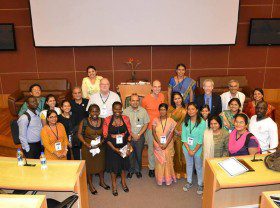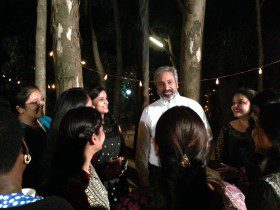 Emerging demographic, economic and dietary factors suggest that a large burden of preventable illness is poised to develop in India requiring training for a new cadre of Indian nutrition scientists. There is a great need for nutrition researchers in the country, but few training programs exist.
Emerging demographic, economic and dietary factors suggest that a large burden of preventable illness is poised to develop in India requiring training for a new cadre of Indian nutrition scientists. There is a great need for nutrition researchers in the country, but few training programs exist.
In response to this critical gap in training, the Bangalore Boston Nutrition Collaborative (BBNC), a collaboration between St. John’s Research Institute in Bangalore (SJRI), Harvard School of Public Health (HSPH), and Tufts University, was initiated in 2009 to build capacity and to provide research training for young professionals in the fields of nutrition and global health from India and other countries in the region.
SAI supports the project, as its goals align with SAI’s own vision of interdisciplinary collaboration to seek innovative solutions to critical issues in South Asia.
The Collaborative recently wrapped up its sixth annual course in January2015 in Bangalore. The intensive 2 week course provided up and coming Indian faculty and graduate students with skills needed for research careers in public health and nutrition.
Faculty included Christopher Duggan, HSPH, Rebecca Raj, Head of Clinical Nutrition Unit at St. John’s Research Institute, Richard Cash, senior lecturer on global health, HSPH, Ronald Bosch, senior research scientist in biostatistics, HSPH, Anuraj Shankar, senior research scientist in nutrition, HSPH, and SV Subramanian, professor of population health and geography.
 Below are some testimonials from participants:
Below are some testimonials from participants:
“The eye opener was the biochemistry session. I learned so many new things about lipids.”
“I liked how the course connected people from various backgrounds and ethnicities to mingle and share their knowledge with each other.”
“We were able to attend the lectures of some of the most eminent scientists who shared their knowledge and expertise with us.”
“Overall, the course was a very high quality, technologically innovative, motivating, and encouraging course to enhance my knowledge in nutrition and research. Thanks for inspiring such budding scientists like me!”
“I got an overview of topics such as the importance of epidemiological studies and infectious diseases. Another advantage of the course is the interaction with fellow students and faculty who come from different background of science to share their experiences.”
“The course has given me a global picture of nutrition and helped me understand the various aspects of nutrition-based researches better.”
The group has also worked to develop distance learning curricula in east Africa and India involving internet-based case discussions, shared curricula, and shared opportunities for discourse. With funding from USAID, NIH, and a private foundation, they have built a collection of online resources for nutrition education.
